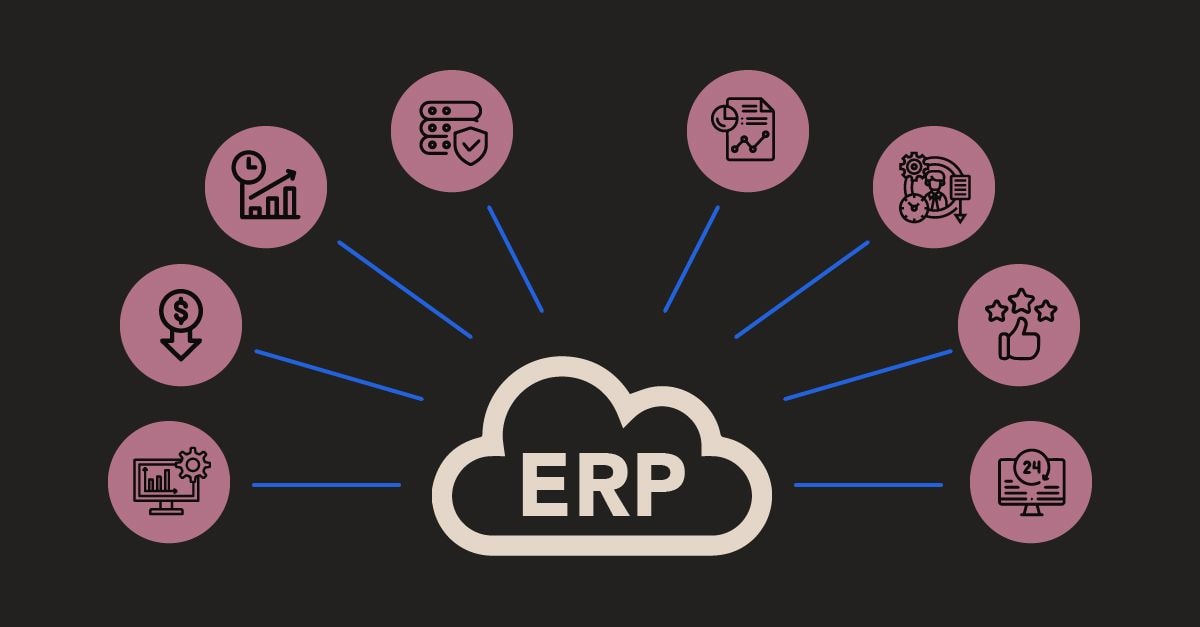The Benefits of Cloud ERP: Scalability, Security, and Cost Savings
Cloud

For decades, businesses relied on bulky, expensive on-premise enterprise resource planning (ERP) systems to manage everything from finances to human resources. But now that traditional model has given way to a more flexible, efficient, and powerful solution: the cloud. Modern cloud ERP systems have become a strategic imperative for organizations looking to streamline operations, reduce costs, and gain a competitive edge.
In this article, we’ll elaborate on the benefits the business can gain with a cloud-based ERP system and explain how the ERP can be implemented as a cloud solution.
What is cloud ERP?
Simply put, an ERP system is the core of every company; it is a single software platform that unifies and automates important business operations and data, giving the whole business access to a single source of truth. Cloud ERP systems (Odoo is a popular business management solution and is available in Kamatera’s Marketplace) are hosted on remote servers and deployed over the Internet as a SaaS model, so businesses can manage core processes such as finance, supply chain, HR, and operations in a centralized system.
Unlike traditional on-premises ERP, cloud ERP systems eliminate the need for heavy IT infrastructure and maintenance. Its flexibility allows all businesses, even huge enterprise customers, to scale resources like storage, processing power, and user access up or down, based on demand. This scalability is enabled through the provider’s shared cloud infrastructure, letting companies adapt to growth or seasonal fluctuations without large capital investments in hardware.

Cloud-based vs. traditional on-premise ERP systems
The main differences between traditional and cloud ERP software include:
- Deployment and infrastructure: Traditional ERP requires significant upfront investment in servers, data centers, and IT staff for maintenance, while cloud ERP offers a lower capital expenditure rate, since it is hosted by the provider and accessed via the Internet.
- Scalability and flexibility: Scaling traditional ERP involves costly hardware upgrades and long implementation cycles. Cloud ERP, however, will allow you to quickly add or reduce resources on demand, making it more agile and cost-efficient.
- Integration capabilities: Traditional ERP systems often face challenges integrating with external applications, requiring complex custom development. Cloud ERP software, with modern user interfaces, is designed with open APIs and built-in connectors, making it easier to integrate seamlessly with other cloud-based tools, such as CRM, e-commerce, or analytics platforms.
- Maintenance and updates: Traditional ERP updates are complex, infrequent, and resource-heavy. In contrast, cloud ERP services deliver automatic updates, so businesses always have the latest features and security patches with no disruptions.
Advantages of cloud ERP systems
The core difference between traditional and cloud ERP systems lies in their approach to deployment and management. Traditional, on-premise systems require a significant upfront investment in physical hardware, software licenses, and an in-house IT team to handle all maintenance, security, and updates. This approach is costly and often leads to an outdated system, as businesses can be slow to implement new versions, due to the complexity and expense.
In contrast, cloud ERP providers usually operate on a subscription model, where the vendor manages the infrastructure on remote servers. This eliminates the need for large capital expenditures and shifts the burden of maintenance and upgrades to the provider. The cloud ERP benefits are substantial: automatic, continuous updates ensure you’re always on the latest version with new features and security patches, while the flexible, pay-as-you-go pricing scales with your business needs. This model offers greater agility, accessibility from anywhere, and enhanced security backed by expert teams, allowing businesses to focus on their core operations rather than managing complex IT infrastructure. Here’s a detailed list of cloud ERP benefits:
Security
Modern ERP providers invest heavily in advanced security measures, like data encryption, intrusion detection, access controls, and multi-factor authentication. These protections often exceed what most businesses could implement on-premises. Data security is guaranteed by secure, redundant data centers with continuous physical security monitoring, reducing risks of breaches and unauthorized access.
Additionally, providers regularly update their systems to counter new threats. This ensures that sensitive business information remains protected, while giving companies peace of mind that their ERP environment adheres to the latest security standards.
Scalability
With cloud ERP, organizations can easily scale resources up or down depending on business needs. For instance, during seasonal peaks, companies can increase system capacity, users, or storage, and scale back during slower periods—without purchasing additional hardware. This elasticity allows businesses to respond quickly to growth or market fluctuations while maintaining cost control.
Consider a retail company that processes three times more financial data during Black Friday and holiday seasons. With cloud ERP, they can automatically scale database capacity and processing power to handle the increased transaction volume, then reduce resources in January when orders return to normal levels. Scalability ensures that the ERP system supports expansion into new markets, product lines, or geographies without disruptive infrastructure upgrades or long lead times, while maintaining consistent performance whether processing routine daily information, backup data, or handling end-of-quarter reporting surges.
Flexibility
Cloud ERP provides businesses with flexibility in deployment, access, and integration. Employees can access the system anytime, anywhere, using web browsers or mobile devices, which is especially useful for remote or distributed teams.
Modules and functionalities can be added or removed as needed, enabling businesses to adapt the ERP to changing requirements. Furthermore, many cloud ERP systems allow businesses to respond to market changes and adopt new business models more quickly than their competitors.
Customization
Unlike the rigid nature of on-premise ERP systems, cloud ERP solutions offer powerful customization. Businesses can easily tailor their workflows, dashboards, and reports to meet specific needs. Many platforms provide intuitive configuration tools and APIs that allow for the creation of custom modules without the need for extensive, time-consuming coding. This flexibility ensures the ERP system adapts to a company’s unique processes, rather than forcing the company to change its operations to fit the software.
The result is ERP software that truly aligns with a business’s industry practices, customer expectations, and evolving operational strategies, helping to maintain efficiency and a competitive edge.
Implementation
Cloud ERP implementation is generally faster and less complex than traditional ERP deployment. With no need for extensive hardware setup or large-scale IT involvement, businesses can get systems running in weeks rather than months or years. Providers often supply preconfigured templates and industry best practices, reducing customization time and cost.
This accelerated implementation minimizes disruptions to daily operations and allows businesses to realize the benefits of ERP, such as improved visibility and streamlined processes, much sooner, driving faster returns on investment.
Upgrade and maintenance
Cloud ERP eliminates the burden of manual upgrades and system maintenance. Vendors automatically roll out updates, security patches, and performance enhancements, ensuring that businesses always use the latest version. This reduces downtime, IT workload, and compatibility issues often associated with traditional ERP upgrades.
Companies benefit from continuous improvements in functionality without disruptive re-implementations. With routine maintenance handled by the provider, internal IT teams can focus on strategic initiatives instead of day-to-day system upkeep, improving overall productivity and efficiency.
Disaster recovery
Cloud ERP providers typically include robust disaster recovery and backup capabilities as part of their service. Data is stored across multiple redundant servers and regions, ensuring minimal downtime in the event of outages, cyberattacks, or natural disasters. Automated backups and failover systems safeguard critical business information, enabling quick restoration of operations.
This resilience reduces risks associated with data loss and operational disruption, providing businesses with confidence that their cloud ERP server can withstand unexpected events and continue supporting essential processes reliably.
Compliance
Leading cloud ERP vendors build compliance features into their systems, helping businesses meet regulatory and industry standards such as GDPR, HIPAA, or SOX. Providers maintain certifications and ensure data management aligns with regional and international laws. Automated audit trails, user access controls, and reporting features make it easier for organizations to navigate cloud compliance and avoid penalties.
By outsourcing compliance-heavy infrastructure to trusted providers, businesses reduce the complexity of managing legal requirements and focus on core activities without compromising governance.
Enhanced analytics and innovation
Cloud ERP platforms increasingly embed artificial intelligence, machine learning, and advanced analytics into their core. These features provide AI-driven predictive insights, automate routine tasks, and identify patterns that improve decision-making. For example, demand forecasting enhances supply chain efficiency, while analytics dashboards deliver real-time visibility into financial and operational performance.
Businesses benefit from cutting-edge innovation without investing in separate analytics systems. By leveraging the provider’s continuous enhancements, companies stay competitive with tools that optimize productivity, uncover opportunities, and drive data-driven growth.
Costs
Cloud ERP solutions usually follow a subscription-based pricing model, reducing the need for large upfront capital investments in hardware and licenses. Instead of incurring ongoing expenses for maintenance, upgrades, and IT staff, businesses pay predictable monthly or annual fees. This structure, while reducing operating costs, also improves cash flow and makes cloud ERP a cost effective solution compared to on premises ERP.
Moreover, companies only pay for the resources they actually use, avoiding waste. The cost savings allows even smaller organizations to access enterprise-grade ERP capabilities affordably.
Disadvantages of cloud ERP systems
While the benefits of cloud ERP systems are numerous, there are some potential concerns that businesses should be aware of. The most common issues revolve around data privacy and security, Internet connectivity, and more. Here are some more examples:
- Data privacy and security concerns: Storing sensitive data on third-party servers may raise concerns about unauthorized access, breaches, or compliance risks, especially in regulated industries.
- Limited control and customization: Businesses rely on the vendor’s infrastructure and roadmap, which may restrict deep customizations or unique configurations compared to traditional ERP.
- Dependency on internet connectivity: Continuous, reliable internet access is required; disruptions can impact productivity and access to critical data.
- Ongoing subscription costs: While there are lower upfront costs, long-term subscription fees may exceed the cost of ownership for some traditional ERP systems.
However, after calculating the return-on-investment (ROI), decision-makers will easily understand that the cloud model is cost-effective and at the same time more robust, secure, and flexible.
Move your ERP to the cloud
Choosing an ERP system is a significant decision that impacts every facet of a business. While on-premise solutions have served their purpose, the undeniable advantages of the cloud model—from scalability and cost-effectiveness to enhanced security and continuous innovation—make it a powerful alternative. By adopting a cloud ERP system, organizations can streamline operations, gain real-time insights, and achieve the agility needed to thrive in a competitive, fast-changing market.
